When the Fitch Ratings agency recently downgraded the United States’ long-term credit rating, Biden administration officials were prepared and frustrated. Despite efforts to lobby against the downgrade, the agency proceeded with the move, leading the White House to launch a swift and assertive response. This response aimed to prevent the downgrade from tarnishing President Biden’s economic record and highlighted the significance of a promising economic outlook for his re-election campaign.
The White House’s counterargument emphasized that the Fitch decision was arbitrary and failed to acknowledge the accomplishments of the Biden administration in fiscal policies and economic growth. Jared Bernstein, the chairman of the White House Council of Economic Advisers, asserted that the response was necessary because Fitch overlooked these achievements.
The timing of the downgrade worked in President Biden’s favor as news coverage was largely focused on the third criminal indictment of former President Donald J. Trump. Additionally, investors appeared to disregard the Fitch Ratings move, with Goldman Sachs researchers stating that it would have minimal impact on financial markets.
Fitch attributed the downgrade to projected fiscal deterioration, a high and growing government debt burden, and governance erosion in the United States over the past two decades. Specifically, they highlighted the repeated debt-limit standoffs and resolutions, which eroded confidence in fiscal management. Concerns were also raised regarding increasing costs of Medicare and Social Security benefits as more Americans retire, indicating that they would be major drivers of rising federal debt in the coming years. Fitch predicted a mild recession by the end of the year. This downgrade marked the second credit downgrade in American history directly linked to debt limit disputes.
The Biden administration swiftly countered Fitch’s actions. Treasury secretary Janet L. Yellen strongly disagreed with the ratings change, calling it arbitrary and based on outdated data. Administration officials further criticized the decision by organizing a call with reporters, questioning Fitch’s delay in downgrading the rating during the Trump administration and its timing after the recent compromise with Republicans in Congress to avert a fiscal crisis.
The administration officials dismissed Fitch’s recession prediction, citing positive recent economic data. They reiterated President Biden’s commitment to implementing spending cuts, along with tax increases for corporations and the wealthy, to further reduce budget deficits in the future. The officials also referred to outside economists and analysts who criticized the downgrade.
Republicans seized the opportunity to criticize President Biden, utilizing the downgrade as evidence of the nation’s deteriorating financial health and unsustainable debt trajectory. Representative Jodey C. Arrington of Texas, the chairman of the House Budget Committee, stated that urgent action is necessary to address the country’s fiscal situation.
For over a decade, fiscal hawks have warned about the growth of America’s debt, which only intensified as lawmakers borrowed trillions to support the economy during the Covid-19 pandemic. Federal borrowing costs rose significantly due to the Federal Reserve’s interest rate hikes aimed at combating inflation.
Despite the credit downgrade, the White House remains steadfast in its commitment to foster a robust economy and reduce budget deficits through a combination of strategic policies.
Unique Perspective: The credit downgrade by Fitch Ratings serves as a reminder of the ongoing concern over the nation’s financial health and its long-term fiscal stability. It highlights the challenges of managing debt, particularly in the face of economic crises. While the White House is defending its economic message, this event underscores the importance of finding a sustainable balance between economic growth and fiscal responsibility.







